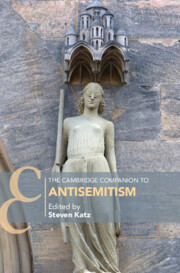Book contents
- The Cambridge Companion to Antisemitism
- Cambridge Companions to Religion
- The Cambridge Companion to Antisemitism
- Copyright page
- Contents
- Contributors
- Acknowledgments
- Introduction
- Part I The Classical Period
- Part II Medieval Times
- Part III The Modern Era
- 15 Martin Luther and the Reformation
- 16 The Enlightenment and Its Negative Consequences
- 17 Modern Antisemitism in Western Europe
- 18 Antisemitism in Late Imperial Russia and Eastern Europe through 1920
- 19 Marxism, Socialism, and Antisemitism
- 20A Antisemitism in Modern Literature and Theater
- 20B Antisemitism in Modern Literature and Theater
- 20C Antisemitism in Modern Literature and Theater
- 21 Antisemitism in America, 1654–2020
- 22 Antisemitism in the Weimar Republic and the Third Reich
- 23 New Islamic Antisemitism, Mid-19th to the 21st Century
- 24 Anti-Zionism as Antisemitism
- 25 New Issues
- 26 Antisemitism in Social Media and on the Web
- 27 Theories on the Causes of Antisemitism
- Appendix The International Holocaust Remembrance Alliance: Working Definition of Antisemitism
- Index
- Cambridge Companions to Religion
- References
15 - Martin Luther and the Reformation
from Part III - The Modern Era
Published online by Cambridge University Press: 05 May 2022
- The Cambridge Companion to Antisemitism
- Cambridge Companions to Religion
- The Cambridge Companion to Antisemitism
- Copyright page
- Contents
- Contributors
- Acknowledgments
- Introduction
- Part I The Classical Period
- Part II Medieval Times
- Part III The Modern Era
- 15 Martin Luther and the Reformation
- 16 The Enlightenment and Its Negative Consequences
- 17 Modern Antisemitism in Western Europe
- 18 Antisemitism in Late Imperial Russia and Eastern Europe through 1920
- 19 Marxism, Socialism, and Antisemitism
- 20A Antisemitism in Modern Literature and Theater
- 20B Antisemitism in Modern Literature and Theater
- 20C Antisemitism in Modern Literature and Theater
- 21 Antisemitism in America, 1654–2020
- 22 Antisemitism in the Weimar Republic and the Third Reich
- 23 New Islamic Antisemitism, Mid-19th to the 21st Century
- 24 Anti-Zionism as Antisemitism
- 25 New Issues
- 26 Antisemitism in Social Media and on the Web
- 27 Theories on the Causes of Antisemitism
- Appendix The International Holocaust Remembrance Alliance: Working Definition of Antisemitism
- Index
- Cambridge Companions to Religion
- References
Summary
Martin Luther’s infamous writings against the Jews are brought into focus, examining both their impact from the 16th through the 20th centuries and the different scholarly approaches toward interpreting them. Luther’s treatises are placed into the historical context in which they were written, and the significance of the response to his writings by his Catholic, Protestant, and Jewish contemporaries is highlighted.
Keywords
- Type
- Chapter
- Information
- The Cambridge Companion to Antisemitism , pp. 273 - 290Publisher: Cambridge University PressPrint publication year: 2022



